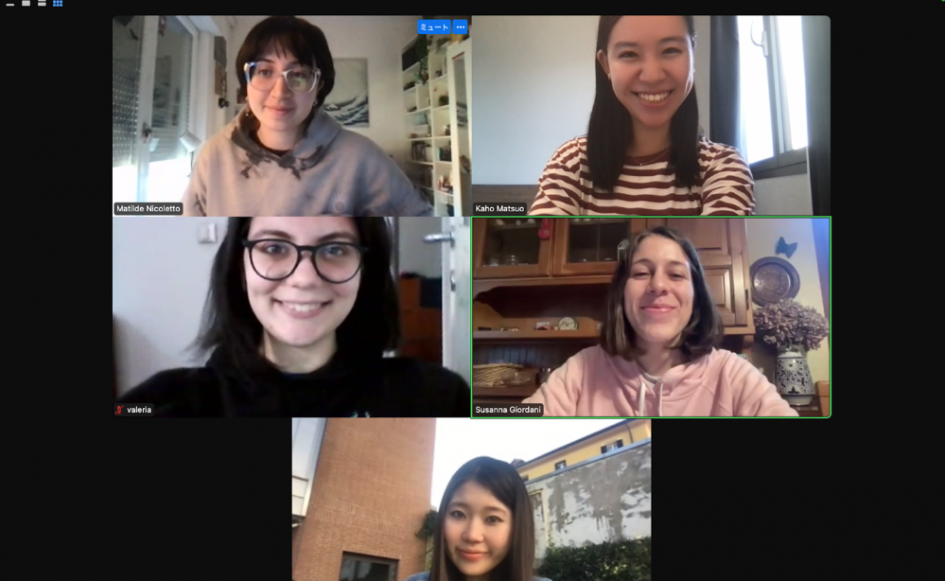グループと個人の自己紹介
はじめまして。私たちは、BEW第2期のグループ6です。私たちは、日本とイタリアの中小企業のコミュニケーションと持続可能なビジネス関係について、異文化間の壁をどのように越えていけるかをテーマに進めています。『異なる文化が出会う時、新しい価値が生まれる』という考えのもと、両国の企業が相互に成長できる方法を探っています。今回のブログでは、このテーマに取り組む中で得られた学びや、今後の展望について共有し、皆さんと一緒に未来の可能性を考えていきたいと思います。
スザンナ・ジョルダーニです。ボローニャ出身で、カフォスカリ大学院の二年生です。カフォスカリでは日本語と経済を勉強しています。日本とイタリアの中小企業のコミュニケーションのテーマを選んだ理由は、日本とコラボレーションするイタリアの企業で働くことが将来の目標だからです。また、企業であっても、各国の文化の違いを見るのは面白いことだと思います。
上智大学3年の別所真衣です。千葉県出身で、社会学・人類学を専攻し、現在はCa’ Foscari大学で歴史を学んでいます。日本とイタリアの中小企業がどのように協力し、持続可能な未来を築けるかに関心があり、異文化間でのコミュニケーションのアプローチの違いを学ぶことで、自身の将来にも活かしたいと考えています。
私の名前はヴァレリア ガンバリーニです。カ フォスカリ大学の 3 年生です。私は経済学部に通っており、日本語を勉強しています。日本とイタリアの企業は、さまざまな面で互いに助け合い、サポートできる国であるため、コミュニケーションが重要だと考えていると思います。
慶應義塾大学3年の松尾佳歩です。出身は鹿児島県です。大学では社会起業、コミュニケーションや場づくりと幅広く学んできました。カフォスカリ大学ではビジネスや食について学んでいます。このテーマを選んだ理由は、日本とイタリアの中小企業の協働について興味があったからです。両国の中小企業が協働する上で意思決定の速さ、交渉の進め方、信頼関係の構築方法などビジネス文化やコミュニケーションスタイルが違う2国間で、互いの文化を理解し、柔軟に対応するためにはどうすべきかについてメンバーとのプロジェクトを通して一緒に考えていきたいです。
マティルデ・ニコレットです。パドヴ出身で、カフォスカリ大学の3年生です。大学で日本語を勉強しています。私は日本とイタリアの持続可能性に関心を持っています。イタリアと日本の中小企業にも関心を持って、コミュニケーションの必要のことについて考えると、面白いテーマだと思います。このプロジェクトを通して、特に異なる文化に基づくことが多い持続可能性とコミュニケーションの分野における両国の違いをもっと知りたいです。
・一般的なテーマ(マクロテーマ)とその背景について
マクロテーマ:中小企業の日本とイタリアのコミュニケーションについて
背景には、日本とイタリアの企業間の関係においてどのようなコミュニケーション戦略が成功の要因となっているか、そしてそれが持続可能な成長にどのように貢献しているかへの関心があるからである。
・それをどのように発展させようと考えているか
①マクロテーマから私たちの興味関心に合っている小テーマを決める。
②小テーマに関連する企業について調査をし、異なる文化的背景や価値観がビジネスにどのように影響を与えるか、また、それをいかに乗り越え、効果的なコミュニケーションを構築しているかについて掘り下げる。
③日本とイタリア双方の文化や価値観の違いがビジネスに与える影響を知る。
④それに伴う課題についてのボトルネックを特定する。
⑤そのボトルネックを根本的に解決することができるような解決策を立案する。
⑥スタートアップの成功に向けて実装方法を検討する。
- グループワークで学んだこと
今月のグループワークでは、「持続可能性」と「コミュニケーション」を軸に、企業がどのように持続可能な成長を目指しつつ、効果的なコミュニケーションを通じてビジネスの発展を図っているかを探求した。各メンバーが異なる視点や情報を持ち寄ったことで、新たな視点が得られ、テーマに対する理解が深まった。また、ディスカッションを進める中で、持続可能性とコミュニケーションが相互に関連し、企業の長期的な成功に欠かせない要素であることを学んだ。さらに、グループワークの現場を通じて他のメンバーの意見に丁寧に耳を傾け尊重し互いの持っているスキルを活かし合うことの重要性や、必要に応じて使用言語を調整し個々の意見を認識の差異を減らすための柔軟な対応をすることの必要性に気付かされた。
——————————————————————————————————————————————–
Group presentation
Nice to meet you! We are Group 6 from the second edition of BEW. Our macro theme explores how Japanese and Italian small- and medium-sized enterprises(SMEs) can overcome cultural barriers to build sustainable business relationships. Guided by the belief that “when different cultures meet, new value is created,” we are investigating ways in which companies in both countries can grow together. In this blog, we will share the insights we’ve gained and tour future outlook in exploring this theme, inviting you to join us in envisioning the possibilities ahead.
Hello, my name is Susanna Giordani. I’m from Bologna and currently in my second year of graduate studies at Ca’ Foscari University, where I study Japanese and Economics. I chose the theme of communication between Japanese and Italian SMEs because my future goal is to work for an Italian company that collaborates with Japan. I also find it fascinating to explore cultural differences between countries, even within a business context.
Hello, my name is Mai Bessho, and I’m a third-year student at Sophia University. I’m from Chiba Prefecture, majoring in Sociology and Anthropology, and currently studying History at Ca’ Foscari University. I’m interested in how Japanese and Italian SMEs can collaborate to build a sustainable future. By learning about the differences in communication approaches between cultures, I hope to apply these insights to my own future.
Hello, my name is Valeria Gambarini. I’m a third-year student at Ca’ Foscari University, studying in the Faculty of Economics and learning Japanese. I believe communication is essential because Japanese and Italian companies can support and help each other in many different ways.
Hello, my name is Kaho Matsuo, and I’m a third-year student at Keio University from Kagoshima Prefecture. At university, I have studied a wide range of subjects, including social entrepreneurship, communication, and community building. At Ca’ Foscari University, I’m focusing on business and food studies. I chose this theme because I’m interested in collaboration between Japanese and Italian SMEs. Through this project with my team members, I hope to explore how companies from both countries can understand each other’s cultures and adapt flexibly, especially given differences in decision-making speed, negotiation styles, and approaches to building trust.
Hello, my name is Matilde Nicoletto. I’m from Padua and a third-year student at Ca’ Foscari University, where I study Japanese. I’m interested in sustainability in both Italy and Japan. I also find the topic of communication between Japanese and Italian SMEs fascinating, as it highlights the importance of effective communication. Through this project, I hope to learn more about the differences between the two countries, especially in the areas of sustainability and communication, which are often based on different cultures.
Macro theme: Communication between Japanese and Italian SMEs
The background of this theme lies in our interest in understanding what communication strategies contribute to successful relationships between Japanese and Italian companies and how these strategies support sustainable growth.
How we plan to develop this theme:
- Define a smaller theme within the macro theme that aligns with our interests.
- Seek companies related to this smaller theme, exploring how different cultural backgrounds and values impact business and how they are overcome to build effective communication.
- Gain a deeper understanding of the cultural and value differences between Japan and Italy and their impact on business.
- Identify bottlenecks related to challenges that emerge through our research.
- Develop solutions that could fundamentally address these bottlenecks.
- Explore methods to implement these solutions with the goal of achieving successful outcomes for startups.
What We Learned from Group Work
This month, our group work focused on “sustainability” and “communication,” exploring how companies aim for sustainable growth while using effective communication to drive business development. Each member brought unique perspectives and information, which helped us gain fresh insights and deepen our understanding of the theme. Through our discussions, we learned that sustainability and communication are closely interrelated and essential for a company’s long-term success. Additionally, working in a group highlighted the importance of attentively listening to and respecting others’ opinions, utilizing each member’s skills, and adapting our language as necessary to bridge differences in understanding. This flexibility underscored the value of creating a more inclusive and cohesive working environment.


コメントを残す